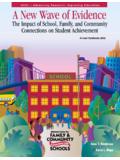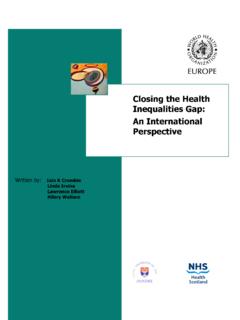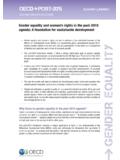Transcription of Culture and Closing the Gap factsheet - Make a …
1 For more information visit as strong cultural identity contributes to indigenous health and wellbeing, australian government initiatives that strengthen Indigenous Culture are important to the Closing THE GAP agenda. Culture AND Closing THE GAPThe rich cultural practices, knowledge systems and cultural expressions of Aboriginal and Torres Strait Islander peoples are a source of great strength, resilience and pride. Strong cultural identity is fundamental to Indigenous health and social and emotional wellbeing. Initiatives that strengthen Indigenous Culture are therefore important to the Closing the Gap agenda, which is a commitment by all Australian governments to work together to improve the lives of Aboriginal and Torres Strait Islander peoples, and in particular, to provide a better future for Aboriginal and Torres Strait Islander children.
2 Initiatives that strengthen Culture also contribute to other government objectives such as social Culture and the building blocks The Council of Australian Governments (COAG) recognises that improving the lives of Aboriginal and Torres Strait Islander peoples will require a sustained commitment from all levels of government, with major effort directed to seven action areas or building blocks : early childhood schooling health economic participation healthy homes safe communities governance and Prime Minister s Closing the Gap Report 2011 acknowledges the importance of promoting strong Indigenous cultures, heritages and languages under the governance and leadership building block.
3 Australian Government programs that support Indigenous Culture are also linked with the safe communities building block. Support for the Indigenous visual arts industry and jobs in the arts and Culture sectors make a strong contribution under economic participation . However, the fundamental role of Culture in Aboriginal and Torres Strait Islander health and wellbeing means that initiatives that support Indigenous Culture are also a foundation stone producing outcomes across the COAG building blocks. Efforts to Close the Gap in Indigenous disadvantage must recognise and build on the strength of Indigenous cultures and identities.
4 (National Indigenous Reform Agreement [1]) The impact of interrupted cultureThe interruption of Culture in causing Indigenous disadvantage cannot be understated: The destruction of Indigenous Australian Culture has resulted in ongoing grief, despair and confusion including the disruption of traditional gender roles (especially for men), cultural values and pride, disruption of kinship networks and support systems, and confusion of people forced to balance between two, often irreconcilable cultures. [2]The Bringing them Home and Deaths in Custody reports demonstrated the devastating impact that fractured Culture has had, and the importance of valuing Culture in healing this as a strategy to support strength, combat disadvantage and promote positive futuresCulture is an important factor to consider in policies and programs to improve outcomes for Aboriginal and Torres Strait Islander peoples.
5 Moreover, the strengthening of Indigenous Culture is a strategy to reduce disadvantage in itself, holding enormous potential for contributing to Closing the Gap outcomes. Keeping Indigenous Culture strong is a necessary part of the solution to Indigenous disadvantage in Australia and to providing a positive future for Aboriginal and Torres Strait Islander Culture AND Closing THE GAP WHAT THE RESEARCH SAYSA boriginal and Torres Strait Islander peoples and communities know and articulate the many benefits of keeping Culture strong. The empirical evidence base lags behind community voices and experiences as the effect of Culture is difficult to measure.
6 Current research relies heavily on qualitative and international studies, and cross-sectional surveys which should be interpreted with care.* However, there is a growing body of research supporting the community view that positive outcomes stem from keeping Culture childhood Traditional Aboriginal and Torres Strait Islander cultures contain natural protective and wellbeing factors such as kinship networks; and language, Culture and cultural identity have been found to be key protective factors that predict resilience in children.[3] According to the Australian Indigenous Doctors Association and the Australian Indigenous Psychologists Association, connection to land, family, Culture and spirituality can protect against ill health and serious psychological distress.
7 [4 5] Identifying, participating in and engaging with Culture are essential to the development of strong and resilient Aboriginal and Torres Strait Islander children and young people.[6]Schooling International research has shown that early childhood Aboriginal language and cultural programs lead to increased self-esteem, improved academic performance, improved school attendance, reduced drop-out rates and better proficiency in reading skills in both the Indigenous language and English.[7] Loss of language in Australia has been found to have negative impacts on directly affected generations and high levels of acculturative stress have been found in children living in regional centres where language loss is occurring.
8 [8 9] Aboriginal and Torres Strait Islander 13 17 year olds in urban and regional areas are more likely to attend school if they speak an Indigenous language than those who do not.[10] Aboriginal and Torres Strait Islander people with strong cultural identity or high participation in cultural activities are more likely to complete secondary school than those with moderate or weak identification and participation.[11] Aboriginal and Torres Strait Islander people that participate in cultural events, ceremonies or organisations; or speak, understand or learn an Indigenous language are also more likely to gain a post-school qualification.
9 [12]Celebration of Indigenous Culture at the NRL All Stars Game, February 2010. Supported by Indigenous Languages Support. National Rugby League, Col Aboriginal and Torres Strait Islander people with strong attachment to Culture have significantly better self-assessed health.[13] Aboriginal and Torres Strait Islander people who speak Indigenous languages and participate in cultural activities have markedly better physical and mental health.[12] Aboriginal health means not just the physical wellbeing of an individual but refers to the social, emotional and cultural wellbeing of the whole community.
10 [14] The Aboriginal and Torres Strait Islander Health Performance Framework identified Culture and identity as a functioning which if improved would improve the potential for Aboriginal and Torres Strait Islander people to achieve better health, and would increase their capacity to be well.[15] The National Mental Health Policy 2008 also acknowledges that cultural identity is fundamental to the wellbeing of Aboriginal and Torres Strait Islander peoples.[16] Research has found Indigenous cultural maintenance to be a determinant of Indigenous health.[17] A ten year study in Central Australia found that connectedness to Culture , family and land are contributors to significantly lower morbidity and mortality in outstation communities.




